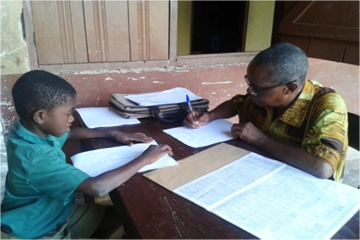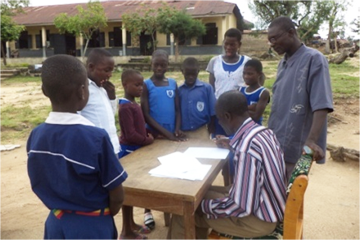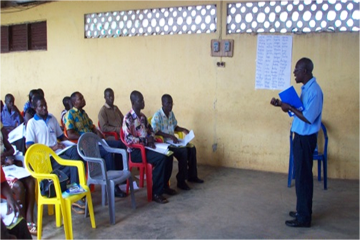Teacher Empowerment
Teacher Empowerment
OLINGA FOUNDATION SHORT PROFILE AND ACHIEVEMENTS. GENERAL OVERVIEW:
Over the last 12 years, the Olinga Foundation for Human Development (Olinga) has been developing a scalable model of literacy teacher training support/intervention at the upper primary level in collaboration with the Ghana Education Service (GES) in three districts across the country: Wassa Amenfi East and West in the Western Region, and the Afram Plains/Kwahu North in the Eastern Region. These districts fall under the Government's most deprived criteria and experience very low rates of literacy attainment among P6 children and experience high dropout rates particularly among the upper primary levels. The Olinga Foundation for Human Development has worked in a close collaborative relationship with the GES and the Ministry of Education in order to achieve a level of scale in each of its target districts in a cost effective and efficient manner.
RECOGNITION: The Ghana Education Service (GES) has endorsed the programme at district, regional and national levels and has encouraged its expansion in all districts of the country (see attached letter from GES Director General). The Enlightening the Hearts Literacy Campaign of the Olinga Foundation, was ranked 11 out of 300 NGOs by The Hewlett Packard Foundation award for the best education programmes in Africa under its Ashoka Award for Education.
INNOVATION: The Olinga Foundations' key innovation is its approach to literacy attainment aimed to transform the instructional practice of teachers and their attitudes towards teaching in the primary classroom. The nine month literacy programme is integrated into the school timetable during the period for literacy and local language learning at the upper primary level in order that primary students who have never learned to read are able to finally break through to literacy. The Government of Ghana literacy achievement testing suggests that less than 25% of children at the upper primary level are able to read and write at an international standard (MOE, 2010) after six years of primary schooling in Ghana. Although the Olinga Foundation recognizes the tremendous need for early grade literacy interventions (at P1-P3) its work has been focused on assisting Government at the upper primary levels in order to provide a remedial approach for children who are still unable to read (75% of those in P5 and P6).
MORAL COMPONENT: The Olinga Foundation has also developed training modules and on site supervision approaches which help teachers become moral leaders and morally responsible teachers in their classrooms transforming their teaching practice and approach towards students. For example, several of the schools in which the Foundation has worked have become free of corporal punishment and have adopted alternative disciplinary approaches. Teachers have also become more gender sensitive towards their female students ensuring larger participation among pupils in the classroom. Read All



